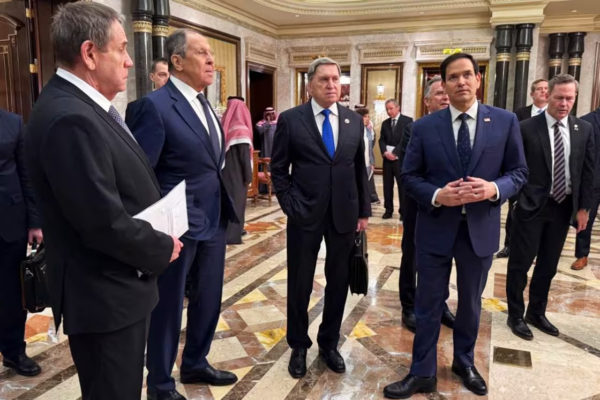Secretary of State Marco Rubio, second right, and Russian Foreign Minister Sergei Lavrov, second left, at a previous round of talks in Riyadh last month. The talks ended yesterday with no deal. There were no immediate plans for another call between Putin and Trump.
Ukraine and Russia have agreed in theory to a limited, 30-day ceasefire, but President Vladimir Putin has essentially demanded Ukraine’s surrender and continued to bomb it.
President Donald Trump’s promises of a hasty end to the war in Ukraine were given a hard reality check Tuesday, with Russian officials saying that the latest round of ceasefire talks with the United States ended without a written agreement and the Kremlin continuing to bomb Ukraine.
The media had been briefed to expect a statement following discussions in Saudi Arabia, but no such written conclusion was released. In an interview with Russian state television, the first deputy chairman of Russia’s defense committee, Vladimir Chizhov, blamed the position taken by Ukraine.
“They sat for 12 hours and seemed to have agreed on a joint statement,” Chizhov told Rossiya 24. “However, this was not adopted due to Ukraine’s position,” he said, calling the holdup “very characteristic and symptomatic.”
The White House did not immediately respond to NBC News’ request for comment on the conclusion of the talks.
While both sides have, in theory, agreed to a limited, 30-day ceasefire, Russian President Vladimir Putin has imposed conditions that would essentially constitute a Ukrainian surrender. Meanwhile, Kyiv says the Kremlin is clearly uninterested in peace, given that it continues to launch nightly mass drone attacks against the country.
Kremlin spokesman Dmitry Peskov told reporters earlier Tuesday that there were no immediate plans for another call between Putin and Trump.
Ukraine, meanwhile, is still counting the casualties from an attack a day earlier in the city of Sumy — on a dense residential area, a children’s hospital and a school — with authorities so far reporting 101 people injured, including 23 children.
Russia fired 139 more Iran-designed Shahed drones into Ukraine overnight, Ukrainian officials said. They added that while 78 were shot down, others caused damage in the regions of Kharkiv, Sumy, Poltava, Kirovohrad, Kyiv, Cherkasy and Odessa.
“Instead of making hollow statements about peace, Russia must stop bombing our cities and end its war on civilians,” Ukrainian Foreign Minister Andrii Sybiha said in a statement Monday. “Any diplomacy with Moscow must be backed up by firepower, sanctions, and pressure.”
Three years after it was invaded by Putin, Ukraine has itself launched retaliatory strikes on targets related to the Kremlin’s war effort. On Monday, the Russian Defense Ministry said it shot down a Ukrainian drone headed for an oil pumping depot that supplies the country’s energy exports.
The ministry said that drone attacks launched by Ukrainian President Volodymyr Zelenskyy “confirm his inability to negotiate.” It added, “The Kiev regime continues to deliberately plan, prepare and carry out attacks on energy infrastructure.”
Russia and Ukraine have continued this mutual bombardment despite agreeing to a limited ceasefire in principle earlier this month. The Kremlin, meanwhile, has issued demands tantamount to a Ukrainian surrender.
There have been subtly differing statements about what this ceasefire might cover, with American readouts referring to “energy and infrastructure” and the Kremlin referring only to “energy infrastructure.”
U.S. and Russian negotiators have also presented starkly different accounts of how the talks were going.
While Moscow’s representatives have appeared circumspect, American officials have sounded optimistic about the talks in Saudi Arabia, even as a parallel ceasefire agreement brokered by the White House in the Gaza Strip has fallen apart.
One of the heads of Russia’s delegation in Riyadh, Grigorii Karasin, was more forthcoming, calling the negotiations “very useful.”
“We discussed everything, there was a busy, not an easy dialogue, but very useful for us and for the Americans,” he told Russia’s state-controlled Tass news agency Tuesday.
“Of course, not everything was resolved, not everything was agreed upon,” he added.
One issue being discussed is the “Black Sea Initiative,” which was designed to help Ukraine ship grain abroad while minimizing the impact of sanctions on Russian food and fertilizer exports. Moscow nixed this deal in 2023, complaining the second half of the deal was not being honored by Western countries.
Russian Foreign Minister Sergey Lavrov said Russia would need “clear guarantees” to resume the deal, and that these “guarantees can only be the result of an order from Washington to Zelenskyy.”
Trump told reporters in the Oval Office on Monday that territory and “lines of demarcation” were among the subjects discussed in Riyadh, as well as a proposal by the U.S. to take control of a key nuclear plant in Ukraine.
“They are talking about ownership of the big nuclear power plant in particular,” he said. “Something like that would be fine with me,” he added, calling it a “great meeting.”
Meanwhile, Zelenskyy gave his most expansive account yet of the remarkable Oval Office bust-up between him, Trump and Vice President JD Vance last month.
He told Time magazine in an interview published Monday that he “was defending the dignity of Ukraine” during that discussion.
CNBC

